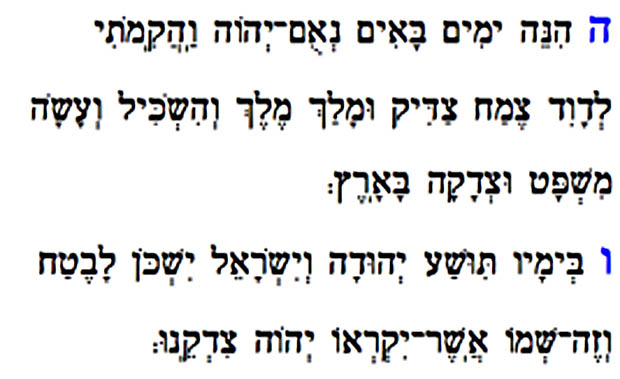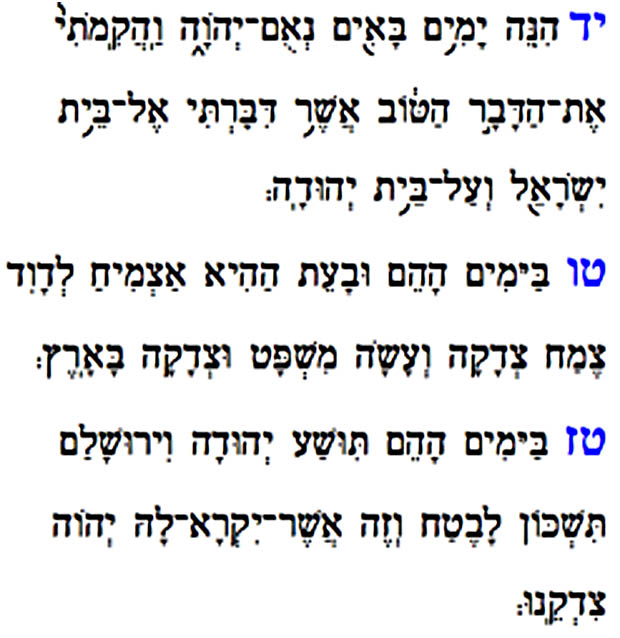Names of Yehovah: Yehovah Tzidkenu
Names of Yehovah: Yehovah Our Righteousness
Introduction
Names of Yehovah are found all over the Bible. Yehovah greatly values names to the point that He sometimes commands name changes. Names identify actions. When a Biblical list of names is literally rendered and the names are connected, they form prophetic statements. Yehovah's names tell His character and what He will do or be. This document gives such a case.
The following two texts take readers into the End Times when Yehudah (Judah) and Jerusalem will be filled only with righteous citizens. They explain what will occur at that time. The first text starts with Jeremiah 23:5 and the second with Jeremiah 33:15:

Jeremiah 23:5 “Behold, days are coming,” declared Yehovah. “And I will cause- a righteous Branch -to-stand to David. And a King will reign. And He will prudently-do. And He will do justice and righteousness in the land. 6Judah will be saved and Israel will abide to safety in His days. And this is His name that he will call Him: Yehovah our Righteousness.”
Identifying pronouns in any text is always one of the most important activities of a reader. I will propose objects to the pronouns in the above text:
Jeremiah 23:5 “Behold, days are coming,” declared Yehovah. “And I will cause- a righteous Branch -to-stand to David. And a King will reign. And He [the King] will prudently-do. And He [the King] will do justice and righteousness in the land. 6Judah will be saved and Israel will abide to safety in His [the King’s] days. And this is His [the King’s] name that he [David] will call Him [the King]: Yehovah our [the Israelis’] Righteousness.”
If these identifications are correct, both David and King Messiah—the righteous Branch—will be present. This Branch, King Messiah, will be identified as Yehovah our Righteousness, the righteousness of the Israelis.
Jeremiah 33:14 and following seems to be saying the same thing, but it isn’t:

Jeremiah 33:14 “Behold, days are coming,” declared Yehovah. “And I will make-arise the good speech that I spoke unto the House of Israel and concerning the House of Yehudah! 15In those days and in that time, I will branch a branch of righteousness to David. And he will do justice and righteousness in the land. 16Yehudah shall be saved and Jerusalem shall abide to safety in those days. And this is whom Yehovah our righteousness will call to her!” 17For so said Yehovah, “A man sitting upon a throne of the House of Israel will not be cut to David 18and to priests the Levites. A man will not be cut from-to the faces of the ascension ascending and incense, a resting and doing sacrifice all the days!”
Two texts in the Bible are frequently similarly worded while they declare very different details. The similar wording is so that a reader can know that they are indeed related, but the differences are so that readers who are careful will make the necessary distinctions in order to understand the texts.
I will propose identifications of the pronouns in the above text:
Jeremiah 33:14 “Behold, days are coming,” declared Yehovah. “And I [Yehovah] will make-arise the good speech that I [Yehovah] spoke unto the House of Israel and concerning the House of Yehudah! 15In those days and in that time, I [Yehovah] will branch a branch of righteousness to David. And he [the branch of righteousness] will do justice and righteousness in the land. 16Yehudah shall be saved and Jerusalem shall abide to safety in those days. And this [the Branch of righteousness] is whom Yehovah our righteousness will call to her [to Jerusalem]!” 17For so said Yehovah, “A man sitting upon a throne of the House of Israel will not be cut to David 18and to priests the Levites. A man will not be cut from-to the faces of the ascension ascending and incense, a resting and doing sacrifice all the days!”
This text and the literal rendering need further explanation. I will take it in its pieces, proposing what each part declares.
“Behold, days are coming.” These are the days of the reign of the Messiah, known also as the Millennium (a 10-century period).
“And I [Yehovah] will make-arise the good speech that I [Yehovah] spoke unto the House of Israel…” It is a good speech because it is a restoration and not an act of wrath against Israel. Yehovah spoke this good speech unto the House of Israel. This text assumes recognition of the split of the Land of Israel into two parts: the House of Israel and the House of Judah. That split will be healed. These prophecies that Yehovah gave were spoken during the time of the split, and they can be found in texts (as in Ezekiel) when the split is regularly shown. In this case, the prophecy was given unto the House of Israel.
“…and concerning the House of Yehudah!” The prophecy was spoken concerning the House of Judah, though it was given unto the House of Israel.
“In those days and in that time…” Those days are the days of the Messiah; that time is the time of the Millennium.
“…I [Yehovah] will branch a branch of righteousness to David.” This branch of righteousness will be that part of Israel that will come from David’s lineage, and thus also from Judah. The entire surviving part of David’s lineage will be completely righteous, and will live that way.
“And he [the branch of righteousness] will do justice and righteousness in the land.” That sums up the character of all the activities of this branch from David. Justice is rendering a right decision based on all facts. Righteousness is doing what is right (ethically right and morally right) according to Yehovah’s view of what is right.
This land refers to the Land of Israel, and it also refers to all the land on planet Earth.
“Yehudah shall be saved…” Judah will be saved from the following and to the following:
- From sin
- To righteousness
- From enemies
- To live before Yehovah
- From uncleanness
- To moral and ethical cleanness
- From iniquities (forms of moral/ethical guilt before Yehovah)
- To innocence
- From transgressions (crossing the commanded boundaries of Yehovah’s Teachings and commands)
- To obedience of the Torah (the Teaching)
- From death
- Unto life (and to having children)
“…and Jerusalem shall abide to safety…” No enemies of the Israelis will be found on the entire planet.
“…in those days.” These are the days of King Messiah (Messiah Immanuel).
“And this [the Branch of righteousness] is whom Yehovah our righteousness will call to her [to Jerusalem]!” The One called Yehovah our Righteousness, Who is King Messiah and Who was formerly known as Salvation (Yeshua), Who brought righteousness to all Israel, will call this righteous Branch from David to come to Jerusalem located on Great Mount Zion.
“For so said Yehovah, ‘A man sitting upon a throne of the House of Israel will not be cut to David and to priests the Levites.’” The Biblical word cut indicates the following:
- Being slaughtered
- Being permanently disconnected from Israel
- Being damned
It is similar to reverse circumcision—where the foreskin is cut and the person is discarded!
If a man won’t be “cut to David and to priests,” that indicates that mortal humans from the lineage of David and the lineage of the priests will continue to live and have children; they will also continue in their offices of rulers and priests.
“A man will not be cut from-to the faces of the ascension ascending…” Hebrew wording permits both from and to to be connected to the same word. The expression, to the faces of, indicates right in front of something or someone. Adding from indicates a removal; thus, being “cut from-to the faces of the ascension” means that the man is violently taken so that he is no longer able to be in front of the ascension (in front of the sacrifice of the ascension), and thus no longer able to serve as a priest (since he is dead). This text declares that a man in the priesthood will therefore continue to serve as a legitimate priest, sending the ascension sacrifices to Yehovah.
“…and incense…” Special priests were assigned to send incense to Yehovah; men in that lineage will continue to do so throughout the Millennium.
“…a resting” This resting is a gift that one places—rests before another to take (to receive). Every sacrifice is a type—that is, it is a picture of some very important event, person or group. The same is true of the sacrifice identified as a resting (wrongly rendered in nearly all translations).
“…and doing sacrifice all the days!” A vital part of the restoration of all things is the restoration of sacrifices. Since every sacrifice is a type, and therefore a teaching tool, restoration of the teaching tools, along with infallible teachings, is a vital part of the plan of Yehovah for Israel.
What the types typify (picture) are almost unknown today, and were barely understood in history. These types will be well-understood after the Tribulation and during the Millennium, and they can be understood now, if a person is willing to consider texts very literally and apply thought to them.
Thus, the priests of Israel will again do sacrifices, ascensions, incense and restings before Yehovah.
Yehovah our Righteousness will be one of the Names of the Messiah of Israel Who will reign as King.

Related: Names of God
Recent additions or updates to the site
The Torah was given to the Jews to instruct them so that they will live
Years between Pharaoh’s Dream Interpreted and Years of Plenty
Israel, Gentiles, and the Millennium
And His Name Shall Be Called Wonderful
Original page August 26, 2011 | Updated January 4, 2021